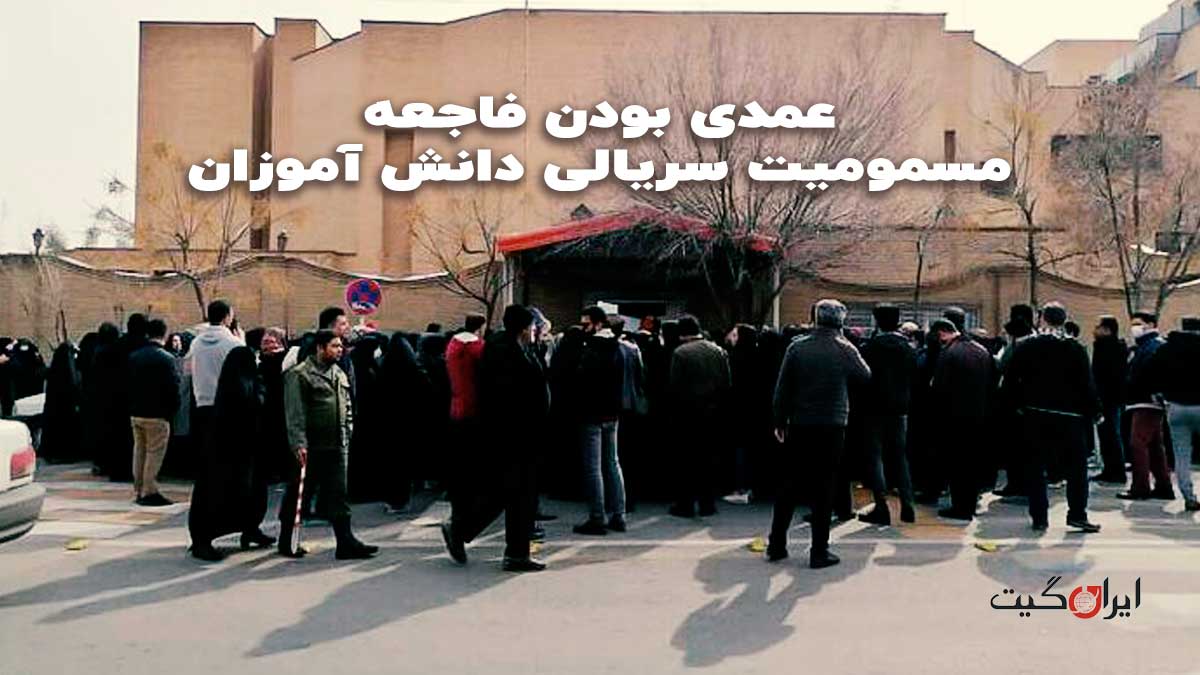Deliberate Nature of the Serial Poisoning Tragedy of Students – Part Three
The deliberate nature of the student poisoning tragedy, as reported by Iran Gate, coincides with new dimensions of intent being revealed in the poisoning of students. Meanwhile, there are reports of restrictions on domestic media from addressing this security issue, suggesting that this case, like the acid attacks in Isfahan, might be overlooked and not pursued by security agencies due to the nature of the issue.
Iran Gate, in line with its mission of transparency and media awareness, has taken this case under special scrutiny and pursuit, striving to inform on this matter with the help of informed and knowledgeable sources while ensuring their security.
Three months after the start of deliberate poisonings of mostly female students in Iran, security agencies have yet to release a report on identifying or taking action regarding it. However, pressures to deny some published reports on this matter have increased. Government-affiliated media claimed on the evening of Sunday, February 26, that the death of an 11-year-old female student named Fatemeh Rezaei in Qom was unrelated to the serial poisonings in Iranian schools.
These suspicious poisonings began on November 30 in Qom schools and have now spread to other cities across the country. In typical governmental media fashion, the state news agency IRNA approached Abolghasem Rezaei, Fatemeh Rezaei’s father, on Monday, February 27, claiming that reports linking his daughter’s death to the poisonings were fabricated by anti-revolutionary networks.
IRNA also published statements from Mr. Rezaei that were reminiscent of the forced confessions commonly broadcast on Iranian state television. Abolghasem Rezaei, Fatemeh’s father, stated that his daughter never experienced poisoning while attending school and that no incidents or problems arose during her time there.
However, what he described as his daughter’s symptoms closely resembled those that media outlets have recently reported as indicative of suspicious student poisonings. Mr. Rezaei mentioned leg pain, stomach ache, vomiting, and fever as his daughter’s symptoms, adding that she died due to a severe infection. Nonetheless, he emphasized that doctors and specialists did not identify any signs of poisoning.
Fazel Meybodi’s remarks caused controversy.
IRNA approached Mohammad Taghi Fazel Meybodi, a member of the Society of Seminary Teachers of Qom, who had told the Shargh newspaper that these poisonings were the work of a millenarian sect in Iran. However, IRNA quoted him saying that he told the Shargh newspaper reporter that this should not have been discussed as the work is incomplete, and research on this is ongoing. Unfortunately, this female reporter misquoted him, and she should not have done that.
On Sunday, February 26, Mohammad Taghi Fazel Meybodi, a seminary professor, emphasized in an interview with Shargh network, following the escalation of the issue of female student poisonings and ambiguities regarding its causes and factors, that the deliberate nature of this incident is a reality. It is said that a group known as the millenarians is responsible for these serial poisonings in schools.
According to this cleric’s statements, this group and ideology believe that girls should not study or at most should study up to the third grade of elementary school. He also described this movement as a religious and anti-modernity movement.
Fazel Meybodi added to his statements by saying that a sociologist, who cannot be named, conducted research in Qom and concluded that these poisonings are not accidental and that the millenarians are responsible for their occurrence.
His statements were published after Younes Panahi, one of the deputy ministers of health, also said that these poisonings were deliberate and that some individuals wanted all schools, especially girls’ schools, to be closed.
However, Mr. Panahi also retracted his statements on Monday, saying that what was attributed to him regarding external causes and the deliberate nature of these poisonings was not confirmed and was not quoted accurately.
In his retraction, he claimed that he had no information about whether these poisonings were due to any external cause or if they were deliberate.
Deputy Minister of Health: The poisonings are deliberate.
Nevertheless, some members of the Islamic Consultative Assembly continue to emphasize the deliberate nature of these poisonings. Fatemeh Maqsudi, a representative of Borujerd, told the Ham-Mihan newspaper that overall, what we are certain about is that the team investigating this incident, which was present in high schools in Qom, emphasizes its deliberate nature.
Despite speculations about these poisonings and the emphasis of government officials and some members of the Islamic Consultative Assembly on their deliberate nature, intelligence and security agencies have not yet released any reports on identifying or possibly arresting those responsible for these poisonings.
The judiciary also announced on Monday, February 27, that it has not reached any conclusions in pursuing this matter. Mohammad Mosaddegh Kahnamoui, the first deputy of the judiciary, said that given the importance of the issue, the prosecutor of Qom has seriously engaged with it, but no results have been achieved so far.
Some informed sources in Qom’s medical and health centers, who wished to remain anonymous, told Iran Gate’s reporter that security agencies were aware of some of these poisonings in advance.
The series of articles on student poisonings have been exclusively reviewed in Iran Gate. You can also read other parts of this article.
- The Silence of Officials Regarding the Serial Poisonings of Students – Part Two
- The Unanswered Mystery of Serial Student Poisonings

